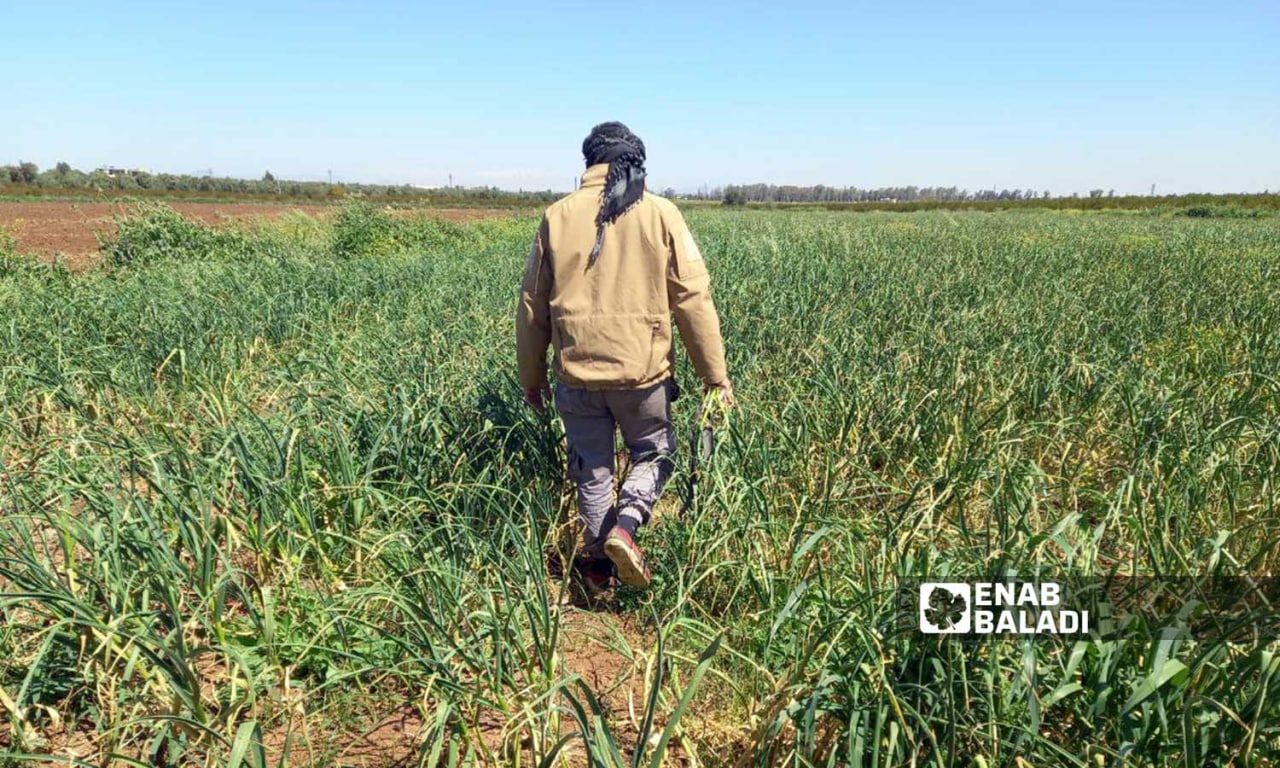



The 33-year-old Maher checks the garlic seedlings in his field, which are turning yellow after their harvest time has passed, as he refrains from harvesting due to the deterioration of crop prices and the increase in the cost of production.
He relies on agriculture in the southern Daraa governorate to support his family, telling Enab Baladi, “profits from selling crops do not cover the cost of their pounds, and our losses are greater than we can count.”
Maher refrained from supplying the garlic crop to the al-Hal market, justifying that the costs of harvesting garlic and sending it to the market exceed the possible profits, as garlic is one of the most expensive crops to harvest. Also, the transportation fees from the lands to the Damascus markets after the increase in diesel price caused greater losses.
The farmers of the Houran region depend on the crops profits to support their families, but many factors during the past months have affected the farmers’ profits, causing huge losses and prompting many of them to refrain from selling crops like Maher.
Maher did not expect his crop to remain on the land, but his risk of harvesting three tons and sending them to al-Hal, the central vegetable market, was the last sale attempt after the “terrifying” losses he had incurred during the past months.
One ton of garlic needs about 20 workers to reap the crop, and the wages of one worker are about 10,000 Syrian pounds (2.5 US dollars), after it was about 7,000 (about 2 US dollars), according to the farmers Enab Baladi spoke to.
The wages of transporting vegetables from the countryside of Daraa to Damascus increased from 150,000 Syrian pounds (40 US dollars) to 350,000 Syrian pounds (90 US dollars) following the increase in diesel prices last March, where the price of a liter on the black market increased from 2,300 Syrian pounds to 5000 pounds, which increased transportation costs, while a kilo of garlic is sold in the al-Hal market for only 600 pounds.
If the diesel price continues to rise, the reluctance to farm will become a way for the farmer to avoid losses, Maher added.
For his part, Jubran, 45, a farmer from the western countryside of Daraa, confirmed that most farmers have refrained from shipping vegetables even within the Syrian governorates after the cost of shipping became a great loss.
The agricultural sector in Syria is experiencing “paralysis” that may push farmers not to think about planting summer crops for fear of draining agricultural capital with successive losses, according to Jubran.
According to Osama Kaziez, a member of the Vegetable Committee in the al-Hal central market, on 17 April, the prices of vegetables in the regime-controlled areas decreased during the past week by more than 30 percent after the volume of supply of vegetables in the al-Hal market increased by about 50 percent.
Kaziez attributed the decline in prices to the release of additional quantities of local production to be disposed of before the ripening of spring vegetables in the coming days.
This comes after the costs of vegetable production increased by between 60 and 70 percent over their cost during 2021, according to what the head of the Farmers Union, Ahmed Saleh Ibrahim, said on 14 April.
On 2 March, the government of the Syrian regime announced the suspension of the export of some foodstuffs, including garlic and onions, for a period of two months “due to the current global reality, and to confront any possible repercussions of developments taking place in the international arena on the internal economic situation.”
And according to what the Presidency of the Council of Ministers stated, these decisions aimed to increase the commodity supply of basic foodstuffs and products and to secure the local market’s need for them during the current period, including the month of Ramadan.
On the other hand, Maher said that the government’s decision to prevent the export of garlic, potatoes, and onions came to control their prices in the market, but the farmer paid the price for this decision, as the local market was filled with goods, which reduced their price.
Many farmers also experienced difficulties selling their goods in the central vegetable market “al-Hal,” which prompted them to refrain from harvesting their crops and try to sell them, according to Maher.
Continuing to close the export door will expose a large number of farmers to more losses for farmers who suffer from the weak purchasing power of the citizen and the deterioration of the economic situation, especially after the decision to lift subsidies, which contributed to further stagnation of vegetables and agricultural crops, Maher added.
For his part, Jubran considered that the decision to reduce the prices of many agricultural crops due to the stagnation in the market came due to the lack of demand for them, as exports were reducing farmers’ losses.
The losses of Daraa farmers did not stop at the garlic, as most of the crops endured similar losses, such as beans, cauliflower, and cabbage.
Last March, a frost wave as a result of a repeated drop in temperatures in Syria hit the spring crops in Daraa governorate, affecting the broad beans and pea crops, and to a lesser extent, the potato crop, as it is still in the germination stage after farmers delayed planting this year’s crops.
(1 USD = 2,814 SYP due to Central Bank, but the pound is trading around 3,900 to the dollar in the black market).
if you think the article contain wrong information or you have additional details Send Correction